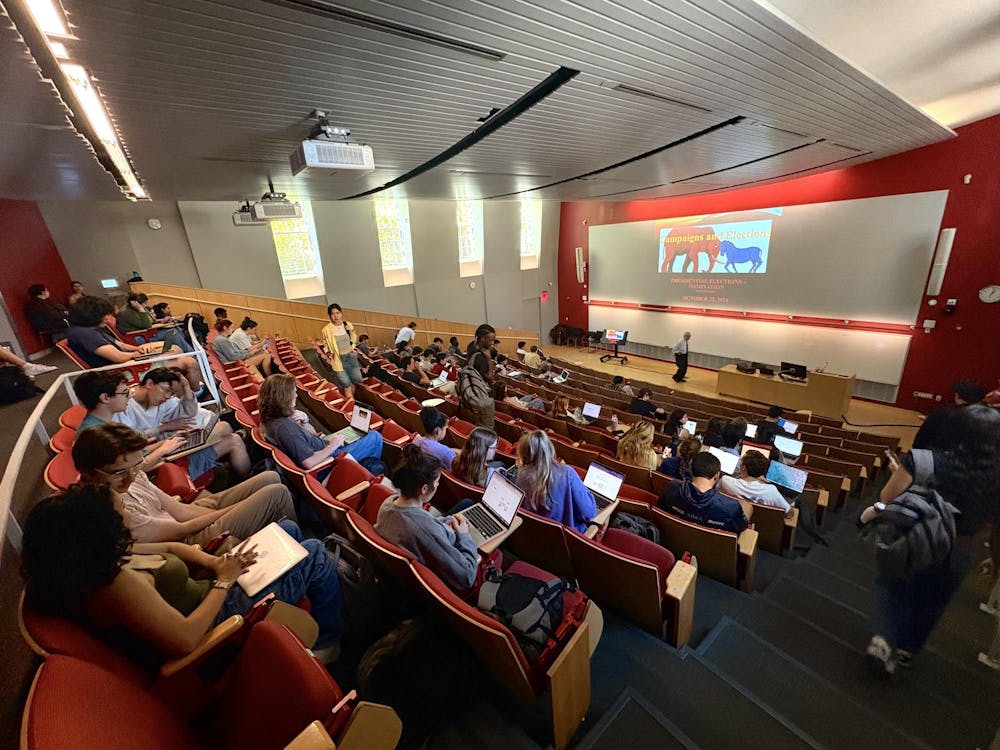This election year, students rushed to register for POLS 1120: “Campaigns and Elections.” The class is taught by Richard Arenberg, a political science professor and a 34-year veteran of Capitol Hill.
The course dives deeply into the electoral process in the United States, discussing the effects of gerrymandering and the role of the Electoral College in the presidential race, Arenberg explained.
This presidential election is one full of “firsts,” Arenberg said. He pointed to President Joe Biden’s decision to drop out of the race after his “catastrophic debate” and the two assassination attempts on former President Donald Trump as unique aspects of this election season.
The Herald spoke to three enrolled students and they all particularly praised the course’s “This Week in Washington” segment, where Arenberg distills current political news at the start of every class.
The Herald spoke to three enrolled students who praised Arenberg for his “This Week in Washington” segment, where he summarizes the current political state at the start of every class.
Arenberg said the segment has been an important component of all the nine courses he’s taught at Brown.
“Campaigns and Elections” has been a part of Brown’s course offerings for many years. Through the course, Arenberg said, he has seen the impact of political events on his students.
The day after Trump was elected in 2016, around half of the students taking Campaigns and Elections were “in tears,” Arenberg recalled.
That day, they spent much of the class talking about the implications of elections.
“If there were ever a time to take the course, it would be now,” said Jackson Schwartz ’26 when asked why he decided to take the course.
Schwartz, a political science concentrator, said that the class has significantly impacted his personal views and helped him better understand previous political events. He cited, for example, Trump’s denial of the 2020 election results.
Mike Woodilla ’27, a Herald columnist who had a “prior interest” in political science, also said the upcoming election motivated him to take the course. He has particularly enjoyed Arenberg’s analysis of campaign spending during the 2022 midterm elections.
Talia Udelman ’28, who is considering taking on a political science concentration, said she took the course because she wanted to be an “informed voter.” Udelman appreciated Arenberg’s focus on the September presidential debate between Trump and Harris in class. Shortly after the debate, students discussed whether or not each candidate achieved their goals with their performance, she said.
When asked what’s particularly striking about U.S. elections, Udelman emphasized “just how large of a role the Electoral College plays,” especially “compared to the popular vote.”
“There’s so much more to (elections) than I initially expected,” Woodilla said.
Being objective is a key tenant of the course for Arenberg. While he has worked for Democratic lawmakers for so many years on Capitol Hill and self-describes as a Democrat, Arenberg still tries to be “fair” and “point out both sides of the issues,” he said.
Arenberg said he purposely schedules the class during election seasons. Also offered last spring, the class has discussed two potential presidential elections this calendar year: “A Biden/Trump election and a Harris/Trump election.”
It’s only fitting that the course was offered both semesters to accommodate such a unique time, Arenberg said.

Teddy Fisher is a senior staff writer who studies International and Public Affairs and is passionate about law, national security and sports. He enjoys playing basketball, running and reading in his free time.





